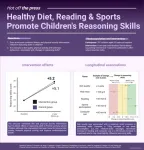According to the World Health Organization, globally, infectious disease is a leading cause of death among children. Furthermore, children are more likely than adults to contract infectious illnesses. However, there’s a gap in research measuring children’s responses to sick faces. It is important to understand how children’s ability to recognize and avoid sickness emerges and develops to help improve children’s health and public health more broadly. Previous research has only reported that adults can use faces to recognize if someone is sick and make judgments about whether to approach or avoid them.
Researchers from the University of Miami, Chinese University of Hong Kong Shenzhen, Duke University and James Madison University addressed this question by collecting photos of people’s faces when they were sick with a short-term, contagious illness, such as COVID-19, and when they were feeling healthy (fully recovered). This study is among the first to use face photos from individuals experiencing natural symptoms of illness and the same individuals when they are healthy. The findings, published in the journal Child Development, showed that adults and older children (8-to-9-year-olds) were able to avoid and recognize sick faces.
“Building upon our previous studies in adults, we hypothesized that sensitivity to facial cues of sickness would emerge in childhood (4-to-9-year-olds). We predicted that this sensitivity would increase with age, reflecting a behavioral immune system that becomes fine-tuned through experience,” said Tiffany Leung, a developmental psychology doctoral student at the University of Miami, who led these projects. “By better understanding how people naturally avoid illness in others, we may identify what information is used and ultimately improve public health.”
To conduct the study, children were recruited through online advertisements (such as social media) and partnerships with local organizations (such as maternity centers and museums). Adults were recruited through the undergraduate research participant pool at the University of Miami. The study sample included 160 participants who were 4 to 5 years old, 8 to 9 years old, and adults. Participants were primarily White (70% of 4- to 5-year-olds, 62% of 8- to 9-year-olds, and 61% of adults) and not Hispanic (63% of 4- to 5-year-olds, 71% of 8- to 9-year-olds, and 80% of adults). Most participants had a primary caregiver with a 4-year college degree (33% of 4- to 5-year-olds, 33% of 8- to 9-year-olds, and 42% of adults) or an advanced/professional degree (51% of 4- to 5-year-olds, 60% of 8- to 9-year-olds, and 39% of adults).
The study was conducted online, with child participants primarily located throughout the United States as well as in Canada and the United Kingdom. Parents, children, and adult participants were required to communicate in English and had normal or corrected-to-normal vision and hearing. Children received a $10 USD gift card and adults received course credit for participating. The Institutional Review Board at the University of Miami approved this study. Informed consent and assent from the caregivers and children were obtained.
The study was completed on Zoom between August 2021 and March 2022 through child-friendly online games. The children were presented with two faces (one sick and one healthy) from the same person, side by side. In the first game, participants were to choose among faces (“Which twin would you rather sit next to at dinner?”) to assess their preference for approaching healthier people. Participants then received a short break during which they were invited to play an unrelated find-the-ball game to prevent fatigue and increase motivation.
In the second game, participants were asked to identify which person was feeling sick. Participants were told, “Imagine that you’re a doctor and you’re working inside this hospital. In this game, it’s your job to figure out who is sick, so you can help them feel all better. Which twin do you think is the one who is feeling sick?” This question enabled the researchers to capture participants’ explicit recognition of sickness.
The research found that children (8 to 9 years old) can avoid and recognize sick faces. In addition, adults were more accurate at avoiding and recognizing sick faces than 8- to 9-year-olds, who were more accurate than 4- to 5-year-olds, suggesting that these skills improve with age. Children who were more accurate at recognizing sick faces were also more accurate at avoiding them. The findings add to a growing body of knowledge that humans are sensitive to illness in faces.
“We’re so grateful to everyone who took part in our studies and especially to those who donated photos of their faces when they were sick,” said Elizabeth Simpson associate professor of psychology and Director of the Developmental Psychology Program at the University of Miami in the College of Arts and Sciences. “To explore whether we can improve sick face perception skills and improve public health, we are continuing to collect sick face photos. For more information about how you or your child can contribute a sick face photo, contact the Social Cognition Lab at SCL@miami.edu.”
The authors acknowledge several limitations. First, the sample mostly consisted of White, Non-Hispanic participants in Western cultures making replications in other populations needed since race may influence sick face perception. Additionally, the study only used still images of faces whereas, in the real world, children have access to voices and body movements so future studies are necessary to further explore these. Finally, adult participants may have had an advantage compared to children since only adult faces were used in the study, so there is a need to use a wider variety of face stimuli, including child faces.
###
This work was supported by the National Science Foundation, Association for Psychological Science James McKeen Cattell Fund Fellowship Sabbatical Award and the Alvin V., Jr. and Nancy C. Baird Professorship.
Summarized from Child Development, “Infection Detection in Faces: Children’s Development of Pathogen Avoidance” by Leung T.S. (University of Miami), Zeng, G. (Chinese University of Hong Kong, Shenzhen), Maylott S.E. (Duke University), Martinez, S.N. (University of Miami), Jakobsen, K.V. (James Madison University), Simpson, E.A. (University of Miami). Copyright 2023 The Society for Research in Child Development, Inc. All rights reserved.
END





